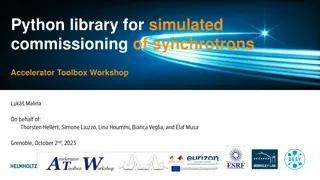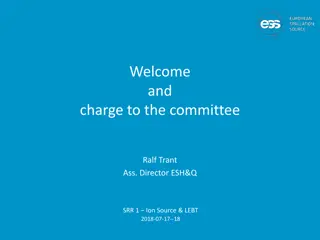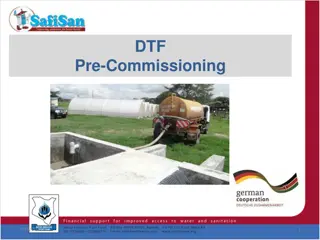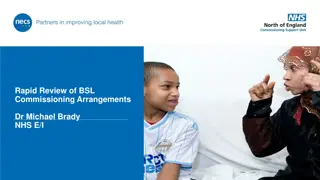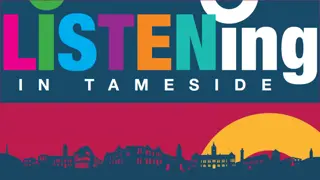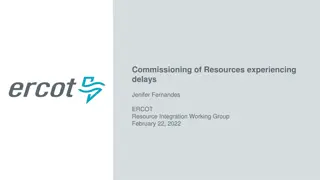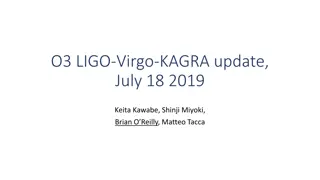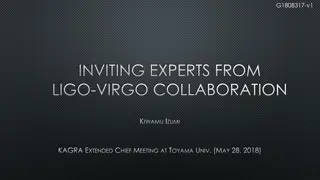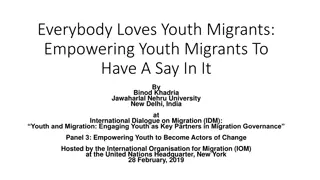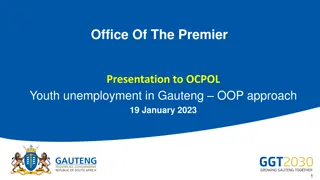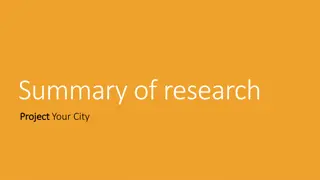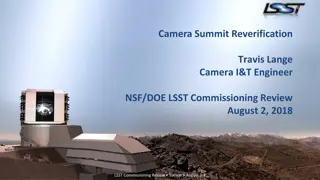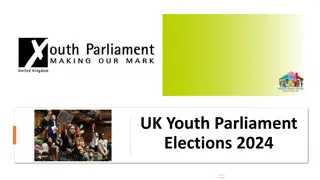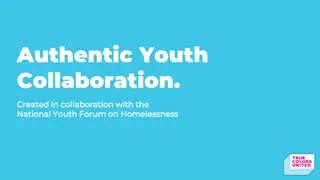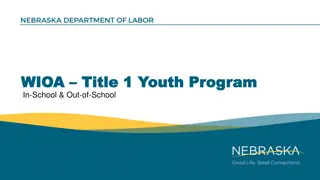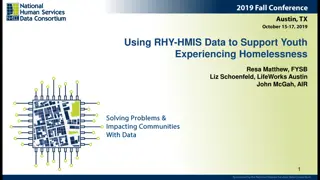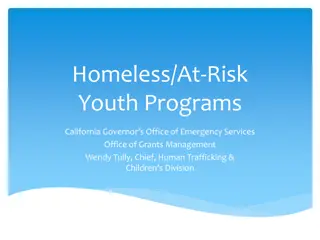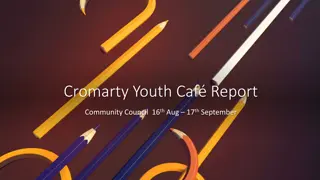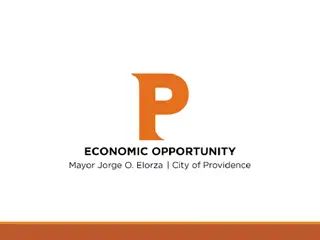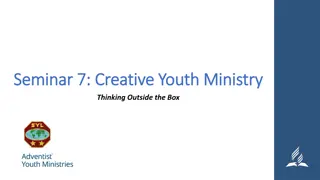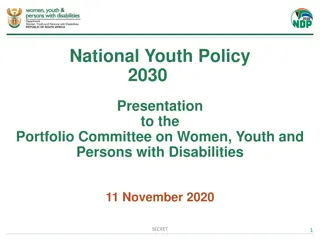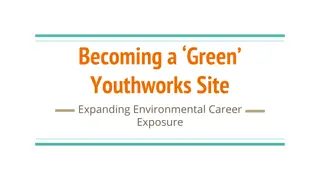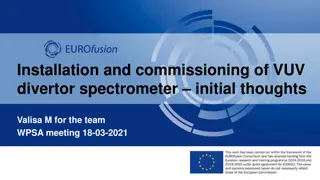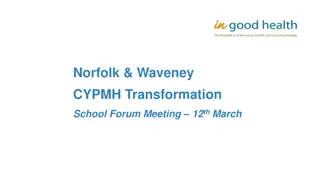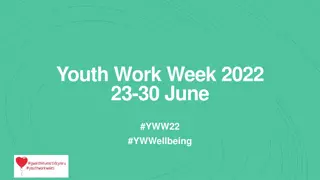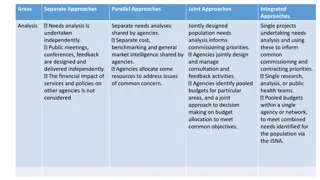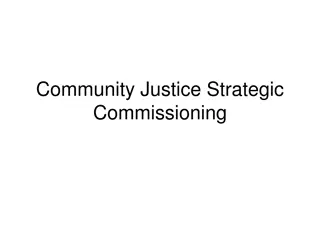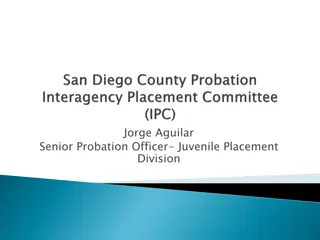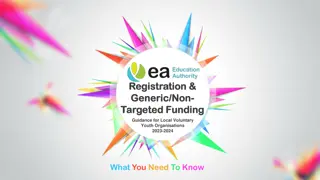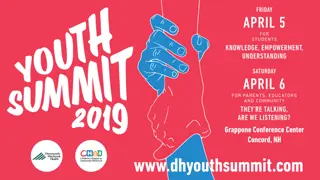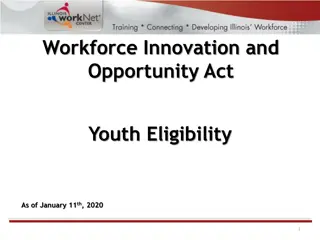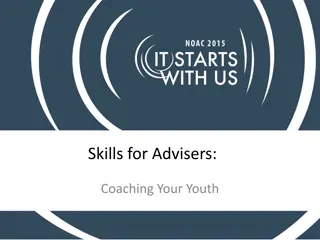Understanding Commissioning Process and Youth Engagement
This content covers training on commissioning processes, aims to involve young people in decision-making, and highlights the importance of effective communication and problem-solving skills. Various activities like ice breakers and group agreements are explored to engage participants in understanding and contributing positively to the commissioning cycle. The analogy of commissioning being like ordering a cake is used to simplify the concept.
Download Presentation

Please find below an Image/Link to download the presentation.
The content on the website is provided AS IS for your information and personal use only. It may not be sold, licensed, or shared on other websites without obtaining consent from the author. Download presentation by click this link. If you encounter any issues during the download, it is possible that the publisher has removed the file from their server.
E N D
Presentation Transcript
COMMISSIONING TRAINING
ICE BREAKER Roll the dice Say your name and answer the question on the dice
AIM AND OBJECTIVES Aim: To understand the commissioning process and what has happened so far in Kent. To make sure young people know how they fit in to the commissioning cycle and how they can make a positive contribution. To evaluate bids & make their recommendations Outcomes: *The ability to communicate effectively about their thoughts on the tenders *Developing planning and problem solving skills *Making a positive contribution-Young people participating at high levels of decision making *Increase their knowledge of commissioning, confidentiality, treating groups fairly
GROUP AGREEMENT On the post it notes put down your ideas for what the group need to do, to work together well
WHAT IS COMMISSIONING? What do you think commissioning is? commission verb (REQUEST WORK) to formally choose someone to do a special piece of work, or to formally ask to formally choose someone to do a special piece of work, or to formally ask for a special piece of work from someone: for a special piece of work from someone: Example: She's commissioned an artist to paint her portrait.
COMMISSIONING IS LIKE A CAKE Batman is holding a big party and he wants to have a cake made, he doesn t have time to do it himself (and doesn t know how to bake very well). So he sends out a tweet to all his baking friends. Batman Batman @therealbatman Calling all bakers: who can make me a cake for my birthday party?
Catwoman can bake a big chocolate cake with strawberries
Batman considers all three options, he thinks about the party and the needs of his guests at the party and decides upon ..
He then sends a contract to Superman agreeing what cake he wants. Superman then bakes the cake for the party. While at the party Batman asks his guests to comment on his cake was it the right cake for them, did it meet their dietary requirements; was it everything they thought the cake should be?
COMMISSIONING IS LIKE A CAKE Batman it s the council/ and you Instead of a cake it s the commission Instead of a tweet it s the call to tender Instead of Batman considering what cake he wants that s what you will be doing reading the recipe s (aka the bids) and deciding what you think is best Instead of the contract for the cake being made you will be helping award the contact to the tenders Instead of sampling the cake it s the evaluation process that happens once the commissioned providers are in and doing their roles
COMMISSIONING IS LIKE A CAKE Batman it s the council/ and you This is what you will be doing next week Instead of a cake it s the commission Instead of a tweet it s the call to tender Instead of Batman considering what cake he wants that s what you will be doing reading the recipe s (aka the bids) and deciding what you think is best Instead of the contract for the cake being made you will be helping award the contact to the tenders Instead of sampling the cake it s the evaluation process that happens once the commissioned providers are in and doing their roles
COMMISSIONING Kent County Council has contracts with organisations throughout the county who are specialists in their area. Next week we will be deciding who will be the best organisation to deliver [what you are commissioning] So what does that mean?
WHY DO YOUNG PEOPLE NEED TO BE INVOLVED IN COMMISSIONING THESE SERVICES? Young people like yourselves understand the needs of other young people better than adults
CONFIDENTIALITY What does confidentiality mean? Why is confidentiality important when we look at the applications? How do we keep this information safe?
CONFLICT OF INTEREST What do we mean by a conflict of interest? What do you think you should do if you think you have a conflict of interest?
HOW DOES THE SCORING WORK? What are we answering? What will this look like? How does the scoring work? What will we need to consider?
WHAT ARE WE SCORING? We will be scoring question number 4: Service User involvement Please explain your approach to co-production with young people and families including how you will meet the HeadStart key principles of co-production respect, ownership and communication
WHAT WILL THIS LOOK LIKE? You will each be given an introductory paragraph from the tender document to give you the context You will be given a copy of the providers answer to question 4 As a group we will look at the application questions and give them a score 0-4
SCORING 0- meets none of the requirements 1- meets some of the requirements 2- meets most of the requirements 3- meets all the requirements 4- exceeds requirements


